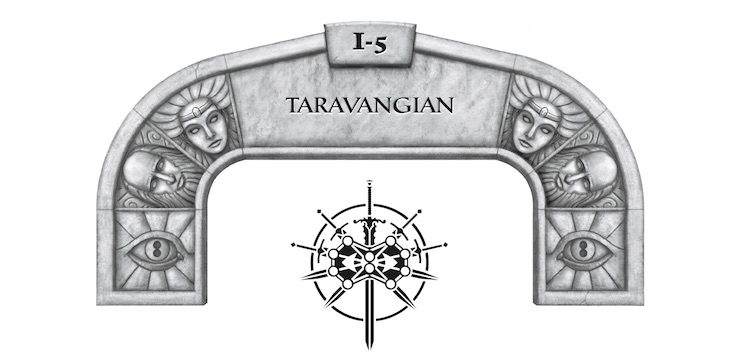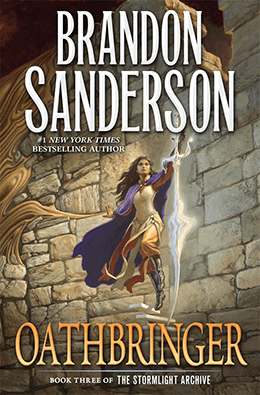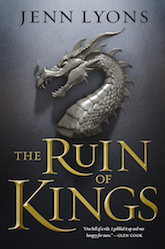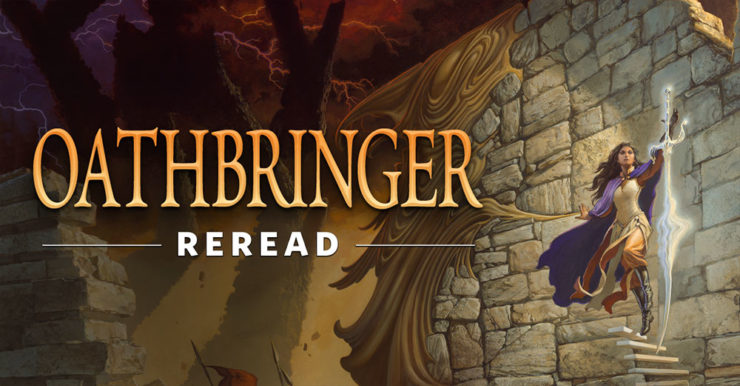Calling all conspiracy theorists! You’re wanted on the Oathbringer Reread this week! We have secret societies, deception among the leadership, calls for murder, charges of idiocy… Yes, if you couldn’t tell, we have a Taravangian interlude this week. Join in to figure out what he’s up to—or at least what he thinks he’s up to.
Reminder: we’ll potentially be discussing spoilers for the ENTIRE NOVEL in each reread. No major Cosmere spoilers this time around, folks. But if you haven’t read ALL of Oathbringer, best to wait to join us until you’re done.
Chapter Recap
WHO: Taravangian
WHERE: Urithiru
WHEN: Sometime after 1174.1.4.3
Taravangian is having a genius day. He fools his testers into thinking that he’s not having a “so intelligent he’s dangerous” day and proceeds to begin tearing up the Diagram, looking for hints and codes that cannot be deciphered when the pages are bound. When Adrotagia calls him out for his deception, he shoves her out of the room and continues, finally coming to the conclusion that Dalinar is not to be killed, now—they’re past that point. Now he must be dethroned as leader of the Coalition, to make room for Taravangian to take his place and hence be in a better place to negotiate directly with Odium.
The Singing Storm

Title: Taravangian
Heralds: Palah; Truthwatchers, Learned/Giving. Ishi, Bondsmiths, Pious/Guiding.
L: So, my guess is that these Heralds are here because this is how Taravangian sees himself. He’s learned (clearly, he’s having a genius day) and he sees himself as guiding the world (or part of it, at least) towards salvation.
AA: There’s a lot of truth to that, Lyndsey, and also that despite his self-perception, he’s doing almost exactly the opposite of the roles he’s claiming. I would also submit that Palah could be a subtle hint that the casual line that the Diagram “hadn’t seen the effect the second son, Renarin, would have” is far more important than it appears at the moment. Ishar also could be a nod toward the repeated references to the Bondsmith that Taravangian is planning to elbow aside. Interestingly, the things he doesn’t understand about Renarin and Dalinar are what make his plans fail.
Icon: Double Eye, indicating an interlude chapter.
Bruised & Broken
The way he thought, breathed, even moved, implicitly conveyed that today was a day of intelligence—perhaps not as brilliant as that single transcendent one when he’d created the Diagram, but he finally felt like himself after so many days trapped in the mausoleum of his own flesh, his mind like a master painter allowed only to whitewash walls.
L: So much about Taravangian makes me sad, but this more than most. It’s almost like he’s suffering from dementia.
AP: I think dementia is a very good comparison. Alzheimer’s patients in particular can “sundown” and be more lucid during the day than in the evening. It can be extremely distressing to them in more lucid moments to know that they are experiencing a cognitive decline and not being able to do anything about it.
AA: The problem with this view of Taravangian is that when he has greater “lucidity” he becomes an absolute monster. In this state, he sort of pities—and totally despises—the person he is when he’s normal; the person he becomes when he actually does experience a cognitive decline, he considers revolting.
L: That’s a fair point, Alice.
“He’s almost to the danger line,” Dukar said.
L: Danger line. Interesting. The supposition here appears to be that the more intelligent someone is, the more dangerous they are. I’m not sure if I buy this. There have been some incredibly intelligent people in our history who didn’t turn into tyrants.
AP: I took this to be a commentary on Taravangian himself, not all super intelligent people. He, in particular, is a danger to others when he has a day that is past the “line”.
Buy the Book


Oathbringer
AA: I’m with Aubree on this. The days when Taravangian’s intellect is high, his compassion and empathy are proportionally low. This is not a generality; it’s a specific peculiarity of his unique Boon and Curse arrangement. It’s not merely that he’s “not very empathetic,” either; he gets unreasonably “pragmatic” about other people to the point that he seriously thinks people who annoy him should be summarily killed.
L: Oh, that’s a cool theory. So for him in particular, it’s more like a see-saw. When his intellect goes up, his empathy goes down, and vice versa.
He carried the Diagram into the room, and then shut himself into blissful self-company, in which he arranged a diamond in each corner—a light to accompany that of his own spark, which shone in truth where others could not venture…
L: Wait. What? Is he just speaking in flowery terms of his own intellect here, or is there more going on with this “light”?
AA: IMO, this is reflecting his delusions of godhood. He firmly believes that when he’s having a “brilliant” day, he’s smarter than any being in the Cosmere—Shard Vessels and immortals notwithstanding. He believes—or he’s convinced himself—that he himself is truly the messiah that Roshar needs to save… well, whatever he himself decides is worth saving. On a meta level, I can’t help thinking that the “light” he considers his own intellect is somehow linked to the light that Odium likes to present himself with, but I don’t have anything solid there.
“Get me a copy of the surgeon’s words upon my birth,” he said to those outside. “Oh, and kill those children.”
L: DUDE.
“Are you…”
“No,” he said. “I haven’t become him again. I am me, for the first time in weeks.”
“This isn’t you. This is the monster you sometimes become.”
“I am not smart enough to be in the dangerous zone.”
L: Pretty terrifying that he played them, though I’m glad Adrotagia saw through it.
AP: Yep, and I think this is why they do need a “danger line” for him.
AA: Adrotagia is far wiser than Taravangian… but I worry about what she’ll support just because it’s coming from him. I find it deeply creepy that smart-but-not-compassionate Taravangian is also deceptive. I mean, the whole “kill those children” is awful, but it just shows him openly writing off anyone he considers lesser than himself (which is everyone, of course). The decision to hide his intelligence so they wouldn’t place limits on him… that worries me. No one but Adrotagia can see through it with any degree of accuracy, and I wouldn’t put it past him to deliberately incapacitate her next time so that she can’t stop him.
AP: I think that is a distinct possibility, and now I’m worried for her!
L: Ugh. I hadn’t considered that until now, but now that you mention it… yeah. I can absolutely see him doing that.
He had the cord wrapped around his neck, the surgeon had said. The queen will know the best course, but I regret to inform her that while he lives, your son may have diminished capacity. Perhaps this is one to keep on outer estates, in favor of other heirs.
The “diminished capacity” hadn’t appeared, but the reputation had chased Taravangian from childhood, so pervasive in people’s minds that not a one had seen through his recent act of stupidity, which they’d attributed to a stroke or simple senility.
He’d overcome that reputation in magnificent ways. Now he’d save the world.
L: So this is why he chose to go to the Nightwatcher in the first place. To prove to the people who said he was dim that he wasn’t, that his knowledge would save the world. Not entirely philanthropic, is it? He’s saving the world out of spite.
AA: Hmm. I think he went to the Nightwatcher in desperation, because he believed Gavilar’s visions were for real. The spite and self-centeredness comes out when he’s “smart” because then he loses all respect for “anybody who’s not me.” Granted, that’s got to be present to some degree in his mind anyway in order to come out on days like this, though.
AP: It seems to be a pretty clear spectrum though, from high empathy to high intelligence. I think on his high empathy days he really does want to try to do good, while on his high intellect days it’s more about power & survival.
L: This is a good observation, that his perception of the event is currently colored by his lack of empathy. Thinking back on it now, I’m willing to bet that less-intelligent Taravangian would have a completely different recollection of his reasons for going.
Also, side note, but this turned out to be a bit of a self-fulfilling prophecy, didn’t it? Everyone said he had diminished capacity, so he… went and made himself have diminished capacity most of the time.
AA: Frankly, I like him better in that mode.
Squires & Sidekicks
…[Malata and Adrotagia] were growing in companionship as Adrotagia attempted to secure an emotional bond with this lesser Diagram member who had suddenly been thrust into its upper echelons, an event predicted by the Diagram…
L: Interesting that she was involved with the organization even before awakening as a Radiant.
AA: Yeah, I’ve wondered about that. Not only someone already involved, but then she gets chosen for the one Order the Diagram said would suit them. I guess… the Diagram was right that the Dustbringer spren would find their kind of person attractive? It makes sense if I squint a little.
AP: It very much makes me wonder where the information for the Diagram came from. Is it just extreme logical interpolation based on the research Taravangian has already done? Or is it actually supernatural? Because if it’s limited to what someone with Taravangian’s history and resources could figure out on a day with perfect problem solving skills, then it’s still going to miss things because Taravangian isn’t omniscient.
AA: I’ve wondered about that too. If it’s based solely on what Taravangian already knows, and he’s filling in the blanks with logic, plus doing a little further extrapolation, there should be a lot of holes in the big picture. After the first two books, I had assumed it was just “extremely logical and intelligent prediction” based on his existing knowledge, but given the scenes from the end of Oathbringer, I’m now leaning toward supernatural. I just don’t see how Taravangian, no matter how much research he’d done, would have all the information to construct the Diagram as we see it later.
“…Now leave me alone. You’re stinking up the place with an air of contented idiocy.”
He shut the door, and—deep down—felt a glimmer of shame. Had he called Adrotagia, of all people, an idiot?
Well. Nothing to do about it now. She would understand.
AA: I’m adding this in at the last second, so unfortunately Lyndsey and Aubree don’t have a chance to add comments, but this made me so angry. Adrotagia is, on the whole, both smarter and wiser than Taravangian, but he takes her understanding for granted. I’m sure this is largely an artifact of “genius mode,” and if he remembers it in “compassionate mode” he’ll apologize. I’m glad to see, at least, that there’s something deep down that can feel shame.
Places & Peoples
…only four blank stone walls, no window, though it had a strange rectangular outcropping along the back wall, like a high step, which Maben was dusting.
L: Chalk this up as another Urithiru oddity.
AP: I keep waiting to get an explanation of what all of these oddities are actually for!
AA: I know, right? I’m always wondering whether Sanderson has something specific in mind for every one of these things, or if he occasionally throws in a feature just to remind us that we know next to nothing about the place. “Don’t get too comfortable here, kids…”
“Calculating the total surface area for farming at Urithiru,” he said, “and comparing it to the projected number of rooms that could be occupied, I have determined that even if food grew here naturally—as it would at the temperatures of your average fecund plain—it could not provide enough to sustain the entire tower.”
[…]
“You think they advanced the growth by use of Stormlight-infused gemstones, providing light to darkened places?”
L: I’m wondering why they’re not considering Soulcast food as a possibility.
AP: Soulcast food is the obvious answer to me too. But I think there’s probably also a magic greenhouse when they turn the city on.
AA: Soulcasting seems pretty obvious, considering that the original inhabitants didn’t even have to rely on fabrials, but instead had two complete Orders who could just do it. (Side note: I wonder if an Elsecaller or Lightweaver can make better food than the people who use the fabrials.) But I agree with Aubree again; when they get this place fired up and running, there will be plenty of food-growing capacity available.
Weighty Words
L: This doesn’t strictly belong here, but since it doesn’t belong anywhere else either, I’d just like to take a moment to note that while we’re in genius-Taravangian’s point of view, Sanderson employs more advanced and complicated sentence structure than he usually does. The sentences are longer and more varied, thereby implicating subconsciously to the reader that the mind we are in is more advanced.
AA: Hah! Nice catch. I’d noticed the seriously long and involved sentences, which are nonetheless grammatically correct and coherent. I just hadn’t put it together with being in genius-Taravangian’s head.
Meaningful/Moronic/Mundane Motivations
Was there a way he could prevent any but the most intelligent from learning to read? That would accomplish so much good; it seemed insane that nobody had implemented such a ban, for while Vorinism forbade men to read, that merely prevented an arbitrary half of the population from handling information, when it was the stupid who should be barred.
L: Oof. Danger line, indeed. He’s veering awfully close into tyranny territory here.
AA: He’s the most dangerous sort of tyrant, too—the one who firmly believes that he’s doing it for the greater good rather than mere selfishness. This puts a little different spin on C. S. Lewis’s comment on tyranny: “Of all tyrannies, a tyranny sincerely exercised for the good of its victims may be the most oppressive.” He’s talking about “moral busybodies” when you put that in context, but the last line of the quote is still frighteningly apropos: “The robber baron’s cruelty may sometimes sleep, his cupidity may at some point be satiated; but those who torment us for our own good will torment us without end for they do so with the approval of their own conscience.” Genius-Taravangian isn’t into tormenting people, but he’ll happily kill them if he thinks it’s useful, and he’ll do it with the approval of his own conscience (such as it is). Then Kind-Taravangian will come along and be properly remorseful, but he’ll be completely unable, and mostly unwilling, to do anything to rein in Genius-T.
The initial explanation of the Dalinar paradigm, from the catechism of the headboard, back side, third quadrant. It had been written in meter, as a poem, and presaged that Dalinar would attempt to unite the world.
So if he looked to the second contingency…
The Diagram hadn’t seen the effect the second son, Renarin, would have—he was a completely wild element.
L: Okay, so why is Renarin a wild element, here? Does it have to do with the influence of his corrupted spren?
AP: I wonder if whatever type of spren Glys is can’t be seen by the diagram? Maybe because both can “see” the future to an extent so they cancel each other out?
L: That’s an interesting theory. Sort of like when two Mistborn burned Atium at the same time…
AA: It’s almost like the Cultivation-based Truthwatcher spren, corrupted by the Odium-formed Unmade who isn’t sure she likes belonging to Odium, makes for an unpredictability that the Diagram can’t cope with. Maybe seeing—or interpreting—the future is based on understanding history, but Glys is something with no precedent to guide their interpretation.
“We must not assassinate Dalinar Kholin. The time has passed for that. Instead, we must support his coalition. Then we force him to step down, so that I can take his place at the head of the monarchs.”
L: Yeah. That’s gonna happen, Taravangian.
AA: It came frighteningly close.
“We can break [Dalinar], and I can take his place—as the coalition will see me as non-threatening—whereupon we’ll be in a position of power to negotiate with Odium—who will, by laws of spren and gods, be bound by the agreement made.”
[…]
“We cannot beat the enemy; so instead, we save whatever we can.”
L: Okay so, ignoring the fact that the coalition isn’t likely to hand over the reins of leadership to someone who they view as senile, let’s talk about this “save what we can” thing, because man… this is definitely a point of contention amongst the fans. Some of us think that Taravangian’s noble for making such a difficult choice—the burden of which will fall squarely on his shoulders, should he have his way. Others feel as if he’s jumping to this conclusion far too easily, that there’s another way, he’s just not looking hard enough for it because the “easy” solution has presented itself.
Buy the Book


The Ruin of Kings
AP: It’s not that easy. He thinks he’s doing the right thing, and that his sacrifice (mental incapacity) justifies the cost to others as well (shared suffering). But that’s extremely dangerous thinking. Zealots are the most dangerous because they have an absolute conviction that they are doing good while actually doing great harm. Taravangian is so caught up in his own intelligence that he doesn’t think that it’s possible that he may have made an error (or several errors). The first rule of Dunning Kruger Club is that you don’t know you are in Dunning Kruger Club…
AA: He also sees his Diagram-writing self as God, without ever thinking about the source of that knowledge. He has some massive blind spots.
Give me the capacity to save us.
L: So… this might not mean what he thinks it does. Capacity in this context could mean any number of things—it might not mean mental capacity. It could be something else entirely, and knowing what we do of the Nightwatcher’s other deals, I’d bet on that Ryshadium. The Nightwatcher reminds me of D&D campaigns I used to play when I was a kid, where the DM would give us an item that granted wishes, or have us encounter a genie—and then would delight in trying to mess with our wishes to give us something other than what we intended. Now, whether or not the Nightwatcher’s intentions are good is up for debate. If Cultivation is directly involved, like she was for Dalinar and (presumably) Lift, the wishes granted seem to be done with the best intents of the world at large, even if they weren’t quite what the asker wanted. But the Nightwatcher alone? I don’t know. It seems… capricious, to me. Like Loki. I have little to base this on, however, unless Aubree or Alice have any concrete examples I’m forgetting…
AA: No examples I can think of, but I really believe that Taravangian is too quick to accept his Intelligence as The Solution… I think the twist to this is going to hurt him badly.
AP: I don’t necessarily think it’s twisted wishes per se, but that both his enhanced mental and emotional capacity will be important. He just doesn’t see the use of the empathy yet. I also suspect that the “good” and “bad” days are not random, but that he is being given the capacity that he needs for that day’s challenges.
Well, then. Join us in the comments with your thoughts on Taravangian and his Diagrammatic shenanigans! Next week, we’ll be back with Interlude 6: the next installment in Venli’s novella, where some really twisty antics take place and we learn much more about the Fused et al.
Alice is looking forward to her daughter’s school Christmas concert tonight. It promises to be awesome—and not solely because of her daughter’s participation… Heh. Also, she assume’s y’all have heard the news about Sanderson’s mysterious Secret Project by now. If not, check out the blog on his website.
Lyndsey is most certainly not having a genius day, but she gets by. If you’re an aspiring author, a cosplayer, or just like geeky content, follow her work on Facebook or her website.
Aubree is inventing a new language to better express her thoughts about the next interlude.










